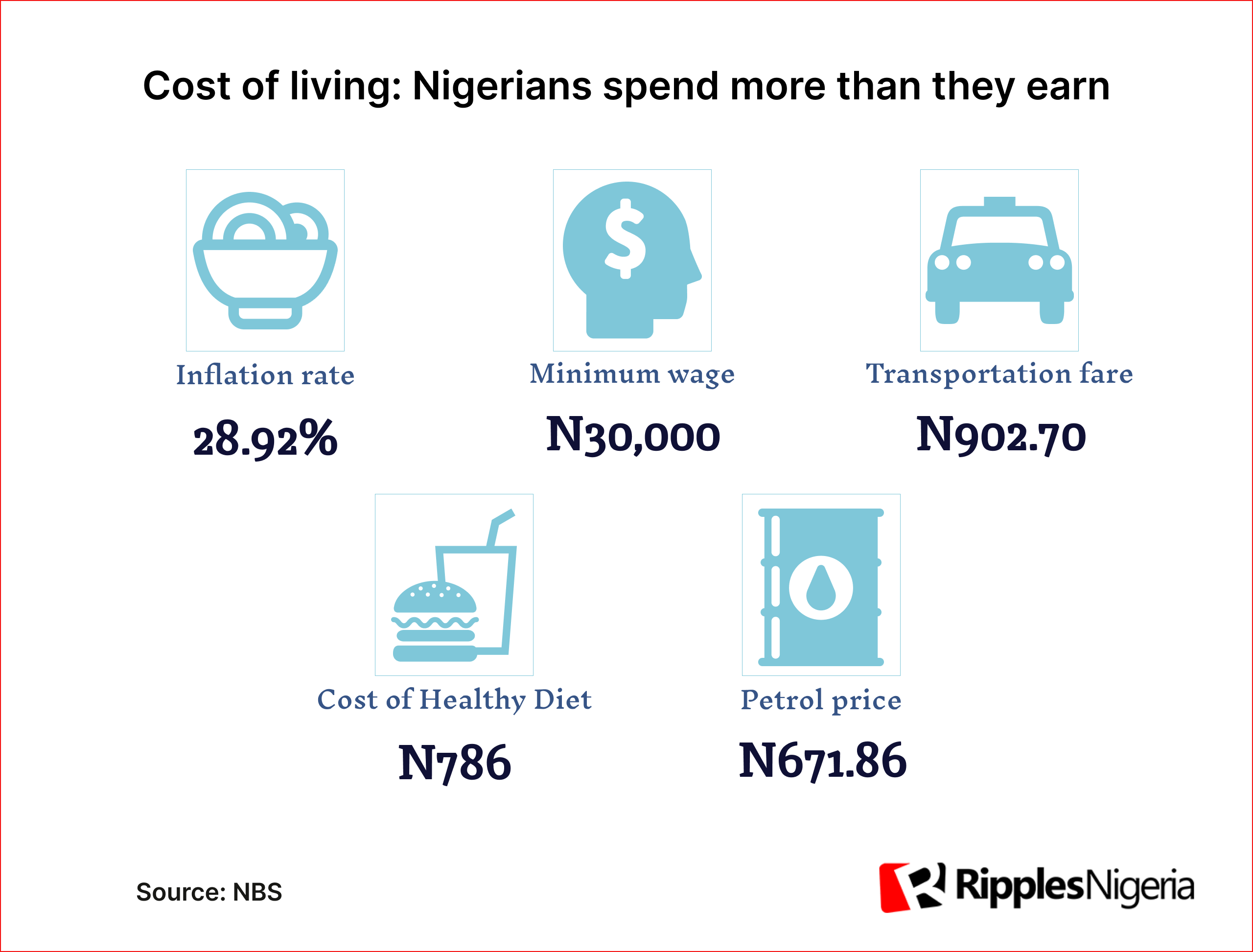Ripples Metrics
RipplesMetrics… Cost of living: Nigerians spend more than they earn

Economic indices gathered by RipplesMetircs indicate that an average Nigerian spends more than he earned in 2023. This would mean that, if a working Nigerian earns the minimum wage, he would barely feed himself for a month.
This development heels on several economic policies that were enacted by the former president, Muhammadu Buhari, and President Bola Tinubu. These policies include the fuel subsidy, depreciation of the naira, impending increase in electricity tariff, and the introduction of Value Added Tax on crude products.
As a response, the Nigerian economy became unstable and these policies affected the market prices of goods, food products, transportation and access to basic needs for survival with some increasing more than 100 per cent in prices.
The cost of living forced many Nigerians to either relocate outside the country, close down businesses, or secure multiple sources of income while other vulnerable looked forward to palliatives from the government.
RipplesMetrics has reported several analyses on the economic policies of Tinubu, the cost of petrol on transportation, the inflation rate, an evaluation of the economy in six months and a market survey on the economy after the removal of fuel subsidy.
The cost of living in Nigeria was analysed based on economic indicators like the cost of transportation, inflation rate, minimum wage and poverty ratio. RipplesMetrics mirrored the expenses of an average Nigerian, Mr John, earning a minimum wage of N30,000 who is obliged to be at work five times a week and feed himself twice daily. This means that the annual income of the average Nigerian is N360,000.
READ ALSO:RipplesMetrics: Nigeria’s states received N3.53 trillion as FAAC in 2023
Our calculation shows that Mr John would be spending more than what he earns to survive.
For instance, the National Bureau of Statistics (NBS) said that the National Average Cost of a Healthy Diet was N786 in December 2023. That means that two healthy meals in a day would cost N1,578. If this is calculated for 30 days in a month, the average Nigerian would be spending N47,340 and N568,080 annually.
Our findings showed that if the annual earning is used to offset feeding, Mr John would still need an extra N208,080 to eat or approximately cannot eat for four months.
Also, on transportation, the average fare paid by commuters for bus journeys within the city per drop was N902.70 in December 2023. This means that a journey to work and back home would cost N1,805.4. In 20 working days throughout December, N36,108 was spent on transport. This is higher than N644.66 paid by commuters for bus journeys within the city per drop in January translating to N25,786.4 monthly.
These figures exclude other necessary bills like house rent, purchasing cosmetics, electricity tariff and other miscellaneous for personal upkeep.
Other worrying data, released by NBS, also said that 133 million Nigerians are multidimensionally poor and the Nigerian inflation rate as of December 2023 rose to 28.9 per cent which is the highest-ever record in the country.
Ripples Nigeria reported how residents of Minna, the Niger State capital, flooded the streets to protest the rising cost of food and living in the state.
By James Odunayo
Join the conversation
Support Ripples Nigeria, hold up solutions journalism
Balanced, fearless journalism driven by data comes at huge financial costs.
As a media platform, we hold leadership accountable and will not trade the right to press freedom and free speech for a piece of cake.
If you like what we do, and are ready to uphold solutions journalism, kindly donate to the Ripples Nigeria cause.
Your support would help to ensure that citizens and institutions continue to have free access to credible and reliable information for societal development.
























